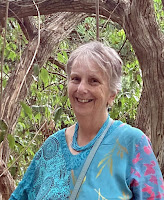Her name was Carolyn May—named for our two
grandmothers—Carrie Rose Schneeloch and May Reid Gilpin. August 5, 1943, marked
both the date of her birth and the date of her death. She arrived full term, but
was never able to take in that first breath.
She was buried in a tiny casket in
the Rose family plot in Oak Grove Cemetery. Her name was never engraved on the
granite stone beneath which already rested our Rose great-grandparents, Great Aunt Lottie, and Grandma's first husband Joseph Roberts. Later Grandma and Grandpa Schneeloch would join them.
When I was born two years after Carolyn, my mother would talk about
her, and I began to think of her as the perfect sister that I would never measure up to. Carolyn
never would have painted the new wallpaper with shoe polish, Carolyn never
would have knocked out Mother’s front tooth with a tuna fish can, Carolyn never
would have cut a hole in Ann McGinity’s red sweater. Never having lived to make
mistakes, she remained free from blame.
As I grew and heard more of my mother’s story, I gained a
better perspective. When I was about two years old, she became depressed, and not understanding these feelings or where they were coming from, she talked to Dr. Leff, our family
doctor. He suggested that perhaps what she was experiencing was grief that she hadn’t dealt with over
losing her first baby. He comforted her as best he could and encouraged her to
find something that brought happy thoughts.
She chose singing. She had
always loved to sing, so she began to use this as therapy, starting to sing
whenever the dark mood would come upon her. Her repertoire was extensive ranging from Irving Berlin to Nat King Cole to Methodist hymns.
It wasn’t until she was in her nineties that she told me
more details about Carolyn. It had been1943, in the middle of World War II.
Nurses were scarce, many having volunteered for the service. It was her first
pregnancy, so she relied on her sister Gertrude who, by that time, was the
mother of five boys. Gertrude’s pregnancies and births were free from complications,
so she thought that’s what she could expect. Other friends at the time had hired
private nurses to be with them as they knew the hospitals were short-staffed,
but she decided against it.
After she arrived at the hospital, it soon became apparent that there was a problem. The nurse on duty was tending to other mothers, so that when she finally came and called for the doctor, the baby had been in distress too long to survive.
Here it was seventy years later, yet her feelings of guilt were still fresh.
All those years she had lived believing that had she hired a nurse, had she
done something different, she could have saved her child.
I had never heard this part of the story before, did not full appreciated the scar it had left. To me, my mother was a happy and optimistic person, always trying to look on the bright side of life. Perhaps all that singing had worked its magic.
because she continued smiling and singing until the very end.















